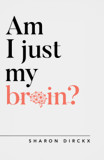
You are out shopping for snacks to bring to the office party and decide on breadsticks and hummus. Did you make the decision? Or did your brain make it for you?
The next day your boss announces cutbacks, and you have to decide whether to go forward for voluntary redundancy or not. You decide yes. Did you make the decision? Or did your brain make it for you?
We make decisions all the time. Mundane decisions like what to eat for breakfast, and important decisions like where to live or who to marry. Our decisions seem to be real and impactful.
But if we are just our brains, as some scientists propose—if our decisions are simply the product of synapses firing—are we really free in any meaningful sense? A number of scientists and philosophers strongly believe not. It may seem to us that our choices are freely made, but free will is actually an illusion, they argue. We simply do what our brains tell us.

Looking at the body, mind and soul to answer the question: What exactly is a human being?
The brain-imaging scientist and atheist Sam Harris began his book Free Will by describing a sordid and brutal attack on a family in Connecticut. It was an attack by two men, one of whom was called Komisarjevsky, that was only intended to be robbery, yet ended with four counts of murder. According to Harris, the attackers could not have done things any differently, even if they had wanted to. The violence inflicted on July 23, 2007 was a product of their genes and upbringing over the long term, coupled with their brain activity in the moment. Harris reflects:
"As sickening as I find their behaviour, I have to admit that if I were to trade places with one of these men, atom for atom, I would be him … If I had been in Komisarjevsky’s shoes on July 23, 2007—that is, if I had his genes and life experience and an identical brain (or soul) in an identical state—I would have acted exactly as he did. There is simply no intellectual position from which to deny this.… Free will is an illusion."
It is disturbing to hear a respected scientist make a dogmatic statement like this. Do science and philosophy necessarily take us to this hard-deterministic place, in which prior causes guarantee a particular outcome? Is it true that there is no other intellectual position? Or is there still a case for free will?
Very much so, thankfully. If we dig deeper, we begin to spot a number of problems with so-called “hard-determinism”. We could ask the following questions.
Is it internally coherent? Does hard-determinism make sense according to its own frames of reference? Not really. Hard-determinism makes it difficult to assert any personally-held belief. Religious people are sometimes accused of being programmed to believe in God. But, we could equally make the case that an atheist has been programmed to reject God, or an agnostic has been programmed to sit on the fence. Hard-determinism makes all personally-held beliefs difficult to justify, and impossible to critique—including hard-determinism itself.
Does it have explanatory power? Does hard-determinism make sense of the world around us? Again, not really. For example, hard-determinism does not make sense of the fact that we humans strive for autonomy. So much of life centres around staying in control. We want to make our own rules, decide our own fate, shape our own lives. So much fear surrounds loss of control over the things we hold dear. But why strive for autonomy if human freedom is an illusion? There is a deep contradiction here. Are we free to make our own rules or not? We cannot have it both ways. In terms of explanatory power, hard-determinism creates more confusion than clarity.
Can it be lived? Does hard-determinism line up with our experience of life? Once more - not really. We live as though our choices mean something: as though those decisions are made by us as volitional people, and not by the mechanistic firing of neurons in our brains. We are considered morally responsible and therefore accountable for our actions, good and bad. Komisarjevsky was tried and sentenced to six life terms without possibility of release. Yet, if his actions of 23rd July 2007 were merely driven by forces beyond his control, then why punish at all? Hard-determinism threatens to completely unravel moral responsibility with implications for justice and society as a whole, which few are willing to implement. We do not live as hard-determinists. We live as though our choices mean something.
Friendship with Jesus is freely available, but begins for those who make the decision to respond to his invitation.
Several viewpoints argue in depth that free will is real not illusory. “Compatibilists” or “soft determinists” believe that, although human behaviour is determined by prior causes, we can also act freely when we are not being constrained or are seeking to fulfil our desires. Libertarians hold that the person, not their brain, is the true source of their actions, regardless of the determining factors in their biology and background. Brains don’t make choices: people make choices and can bring about alternative possibilities, if they so wish. And even if impulses do arise, we still have the capacity to allow them or stop them. We call it self-control, or resisting temptation. Philosopher Michael Shermer calls it “free won’t”, and describes this as “veto power over innumerable neural impulses tempting us to act in one way, such that our decision to act in another way is a real choice.”
Much more could be said about the case for free will. If it is true that we are free, volitional beings, then for what purpose? Choice is integral to relationships. Romantic relationships and friendships begin and continue on the basis of decisions and feelings. It is no different with God. God’s desire is that all people would come to know him. He offers us friendship. Jesus himself said, “Come to me, all you who are weary and burdened, and I will give you rest” (Matthew 11 v 28). Friendship with Jesus is freely available, but begins for those who make the decision to respond to his invitation.
In Am I Just My Brain? neuroscientist Sharon Dirckx lays out the current understanding of who we are from biologists, philosophers, theologians and psychologists, and points towards a bigger picture, that suggests answers to the fundamental questions of our existence. Not just "What am I?", but "Who am I?"—and "Why am I?". Buy the book here.